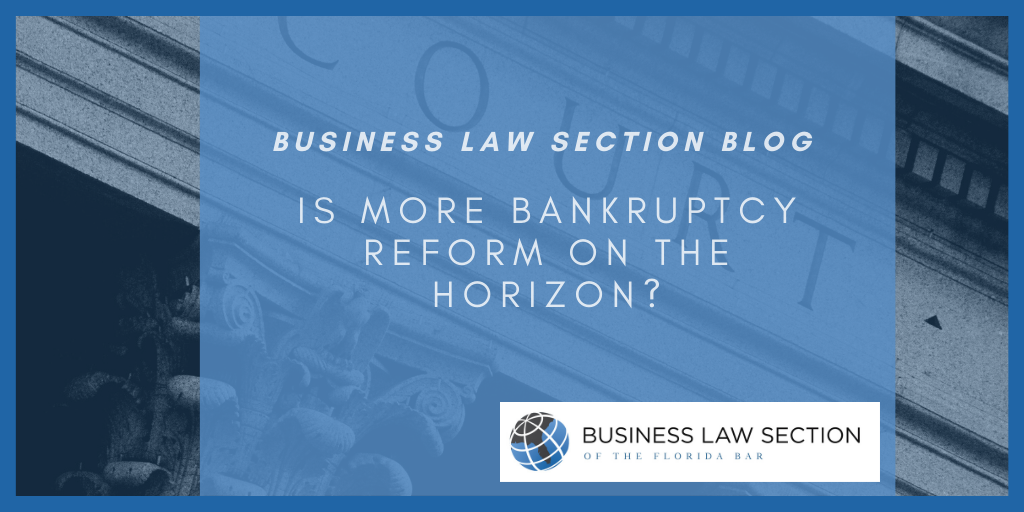By Dennis LeVine, Kelley Kronenberg
Proposed Legislative Changes to the Bankruptcy Code
Summary. Amid current legislative gridlock on so many issues, Congress surprisingly has been able to enact several significant changes to the Bankruptcy Code in the last year. With the economy still reeling due to the pandemic, and Congress considering an additional stimulus bill, more bankruptcy changes may be coming.
In 2019, Congress passed the new “Small Business Reorganization Act” (SBRA), which opened up significant new opportunities for small businesses to reorganize in Chapter 11. In March 2020, Congress passed the “Coronavirus Aid, Relief, and Economic Security Act” (CARES Act), which made several revisions to the Bankruptcy Code, including:
(1) Increasing the unsecured debt limit for SBRA debtors from $2.7 million to $7.5 million;
(2) Excluding the tax rebates paid to individuals from the definition of “current
monthly income” and the Chapter 13 means test, and;
(3) Permitting debtors who confirmed plans prior to the enactment of the CARES Act to modify their plans and extend their repayment period for up to seven years. This relief is temporary since the revisions in the CARES Act will sunset a year after its enactment.
With additional coronavirus-related stimulus legislation currently being debated, we may see more changes to the Bankruptcy Code before the end of the year. For instance, to address uncertainty as to whether Chapter 11 debtors can obtain a Paycheck Protection Program (PPP) loan, Section 116(a) of the proposed new stimulus legislation provides that such loans may be made as DIP loans under 11 U.S.C. § 364. [1] Such loans would be given a super-priority administrative-expense priority if the loan is not forgiven. This proposed super-priority claim is controversial since it may create difficulties for debtors in Chapter 11 attempting to negotiate first-day orders and financing arrangements.
Other bills are currently pending in Congress that would provide bankruptcy relief for consumer debtors. The “Taking Responsibility for Workers and Families Act,” introduced in the House in March 2020, would provide an increase in the homestead exemption under § 522(1)(A) from $15,000 to $100,000, and allow debtors to obtain a Chapter 13 discharge under § 1328 even if the debtors failed to make up to six payments to a holder of a debt secured by real property. Additionally, the act would permit debtors to obtain a Chapter 13 discharge if the debtors (a) have made payments under a confirmed plan for at least one year, and (b) are experiencing a loss of income and/or increase of expenses due, directly or indirectly, to the pandemic.
Another pending bill is H.R. 5899, introduced in the House in February 2020. This bill would permit debtors to discharge in bankruptcy any student loan debt that arose after the date of the bill’s enactment. In addition, both the House and the Senate have introduced the “Student Loan Debt Relief Act of 2019,” which provides bankruptcy relief to all student loan debtors by allowing debtors to discharge their student loans – without any limitation as to when the student debt arose.
While it would seem unlikely the current Congress could pass far reaching student loan relief, we may see revisions to the Bankruptcy Code to provide additional bankruptcy relief to individuals and small businesses. The American Bankruptcy Institute’s Consumer Bankruptcy Commission report published in 2019 contains more than sixty suggested revisions to the Bankruptcy Code. Nevertheless, there is a lack of pending legislation to provide relief for larger businesses that are also struggling due to the COVID-19 pandemic, including businesses with retail lease obligations.
About the Author:
Dennis J. LeVine is a partner at Kelley Kronenberg, a multi-practice business law firm. He focuses his statewide practice on bankruptcy litigation and creditors’ rights. Mr. LeVine is one of a select few attorneys in Florida to be Board Certified in both consumer bankruptcy law and business bankruptcy law by the American Board of Certification. He may be reached at (813) 223-1697 or dlevine@kklaw.com.
[1] SEC. 116. BANKRUPTCY PROVISIONS.
(a) IN GENERAL. — Section 364 of title 11, United States Code, is amended by adding at the end the
following:
“(g)(1) The court, after notice and a hearing, may authorize a debtor in possession or a trustee that is
authorized to operate the business of the debtor under section 1183, 1184, 1203, 1204, or 1304 of this title to
obtain a loan under section 7(a) (36) of the Small Business Act (15 U.S.C. 636(a)(36)), and such loan shall be
treated as a debt to the extent the loan is not forgiven under section 1106 of the CARES Act (15 U.S.C. 9005)
with priority equal to a claim of the kind specified in subsection (c)(1) of this section.
“(2) The trustee may incur debt described in paragraph (1) notwithstanding any provision in a contract, prior
order authorizing the trustee to incur debt under this section, prior order authorizing the trustee to use cash
collateral under section 363, or applicable law that prohibits the debtor from incurring additional debt.
“(3) The court shall hold a hearing within 7 days after the filing and service of the motion to obtain a loan
described in paragraph (1).”
* * *
“(e) … Notwithstanding section 1322(a)(2) of this title and subsection (b)(1) of this section, a plan that
provides for payment of a claim of a kind specified in section 503(b)(10) of this title may be confirmed if
the plan proposes to make payments on account of such claim when due under the terms of the loan
giving rise to such claim.’’.

